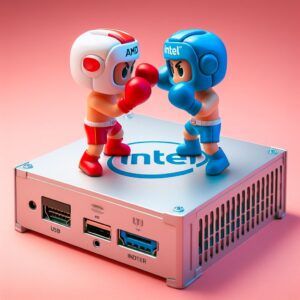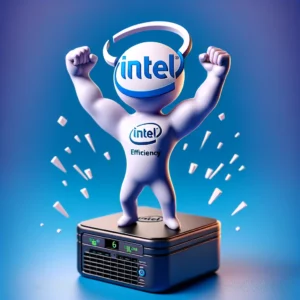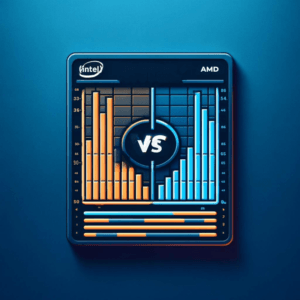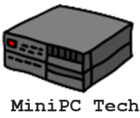
The Heart of Mini PCs: Choosing Between Intel and AMD
When I consider the heart of a mini PC, the central processing unit (CPU) immediately comes to mind. The Mini PC CPU dictates not just the performance but the very capability of our compact companions. In this space, Intel and AMD stand as the prominent rivals, each brandishing distinctive features that merit our attention.
Intel: Efficiency and Single-Threaded Prowess

Intel’s CPUs are reputable for their power efficiency and strong single-threaded performance, a vital trait for applications not optimized for multiple cores. AMD, on the other hand, has gained traction with its multi-core performance and attractive price-to-performance ratio, making it a favorite among power users on a budget.
Looking back, Intel historically dominated the mini PC market, but AMD’s recent advances have intensified the competition. This tug-of-war has fueled rapid innovations, resulting in processors that are more powerful and energy-efficient than ever before.
AMD: Multi-Core Performance and Value

A fundamental aspect distinguishing these contenders is their processor architecture. Intel has refined its approach with a focus on hybrid architectures in their latest chips, whereas AMD continues to innovate with its modular design philosophy, pushing the envelope in multi-threading performance.
Now, why does the thermal design power (TDP) factor so prominently for mini PCs? Simply put, the constrained form factors demand CPUs that manage heat effectively while maintaining performance. A lower TDP can signify a more suitable processor for the tight confines of a mini PC, reducing the risk of overheating and enhancing longevity.
With these considerations in mind, we move towards a practical assessment. In the upcoming section, I’ll take you through a rigorous evaluation of their performance. We’ll look at the numbers, interpret benchmarks, and consider real-world applications, offering you a crystallized view of what each brand’s CPUs bring to the table.
Mini PC CPU Performance Faceoff: Benchmarks and Real-World Use
Performance Faceoff: Benchmarks and Real-World Use
In the quest to compare Intel and AMD mini PC processors, performance benchmarks are invaluable. They provide a way for us to measure and compare the raw processing power of CPUs under controlled conditions. We examine a range of benchmarks, from PCMark 10, which simulates everyday tasks, to Cinebench, which focuses on rendering performance reflective of demanding graphical tasks.
Benchmarks Analysis: Intel vs AMD

Using the latest benchmark results, I aim to give you a clear and accurate picture of how Intel and AMD CPUs stack up against each other. It’s not just about raw numbers; I explore what these results mean for you. For tasks like web browsing and document editing, an Intel Core i5 might suffice, but for rendering or heavy multitasking, an AMD Ryzen 7 could prove superior.
Beyond Benchmarks: Real-World Performance Insights
Real-world performance matters just as much as synthetic benchmarks. This encompasses how the processor handles multitasking, gaming, video editing, and more. It’s essential to consider how these CPUs perform in the environments they’ll actually be used in. Beyond the benchmarks, we’ll look at anecdotal evidence from users who push these mini PCs to their limits in daily use.
Compatibility Check: Motherboards, RAM, and Beyond
While performance is critical, it’s not in isolation. The compatibility with other system components within the mini PC ecosystem, such as motherboards and RAM, has a direct effect on the machine’s overall efficiency. A high-performing CPU matched with slow memory or an inadequate motherboard may not deliver its full potential.
Assessing Value: Cost, Power Consumption, and Warranty
Finally, when discussing value for money and longevity, I’m steering clear of vague assertions. Concrete aspects like warranty period, projected lifespan, and power consumption contribute to the overall cost of ownership. Both Intel and AMD offer compelling arguments in this space, but the optimal choice depends on an individual’s priorities.
Decision Time: Which CPU Powers Your Next Mini PC?
I’ve walked you through the gritty details of performance benchmarks and real-world applications. Now, it comes down to making a choice. Selecting a CPU for your next mini PC isn’t just about raw numbers; it’s about what YOU need. Whether it’s performance, budget-friendliness, or energy efficiency, you’ve got distinct options with Intel and AMD.
Consider how you use your PC. If advanced gaming or heavy multimedia editing is on your daily to-do list, look for CPUs that excel in performance. On a tighter budget? AMD often provides competitive performance at a lower price point. For those concerned with power consumption—perhaps making a mini PC media center—a processor with a lower TDP will be a priority.
Support and warranty terms can be deal-breakers. Intensive use can lead to hardware stress, and a robust warranty could save you significant hassle and expense. A responsive customer service department is a lifesaver when you need quick answers.
The Future of Mini PC Computing: Intel or AMD?
Will your needs change in the next few years? If you think they might, consider a CPU with an upgrade path that won’t require a complete system overhaul. Both Intel and AMD have platforms that promise some forward compatibility, but it varies by model and motherboard.
Don’t just take my word for it—look at what other users and reputable reviewers are saying about the CPUs you’re considering. Community forums, professional tech review sites, and direct user feedback offer invaluable insights that might sway your decision.
Remember, there’s no ‘one size fits all’ solution. Reflect on your personal requirements, potential future needs, and, indeed, those benchmarks and reviews. By carefully balancing these factors, you’re best positioned to make an informed decision that you’ll be content with for years to come. May your choice lead to a productive, enjoyable computing experience!

I am a retired software engineer with experience in a multitude of areas including managing AWS and VMWare development environments. I bought a relative a mini-PC a year ago and have become passionate about the technology and its potential to change how we deploy software.
